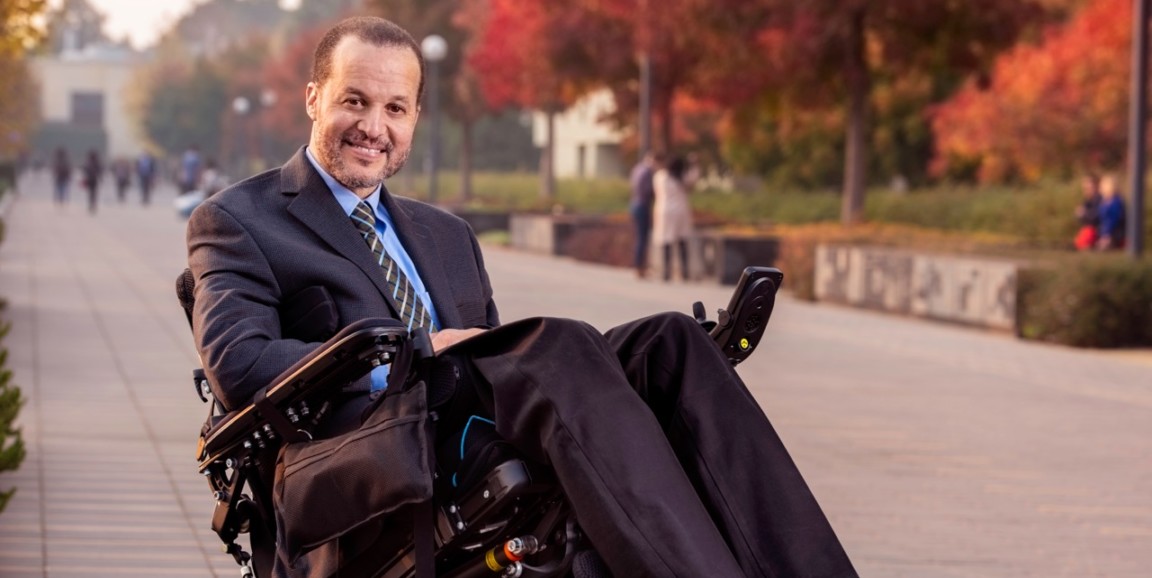When Eric Sibley, MD, PhD, began his career 1993 as a young physician-scientist in pediatric gastroenterology at Stanford, his future couldn't have looked more promising.
Sibley, an African-American who grew up in Los Angeles, spent the first 15 years of his career making notable strides in his research and gaining accolades, memberships and leadership roles in national academic societies. He had a happy marriage, two healthy children, and a career that was rapidly rising by 2009, when he was diagnosed with the most aggressive form of multiple sclerosis.
In a story for Inside Stanford Medicine, I describe how, as Sibley moved from cane to crutches to wheelchair over the following years, he didn't dwell on the odds that would make his continued success seem almost impossible. Instead, he focused on being a role model who would pave the way, showing others -- as his own African-American mentors at Harvard University and Johns Hopkins University had once shown him -- that it was indeed possible, and that his experience positioned him to make a unique contribution to the academic medical community.
I spoke with Sibley's colleagues, students, family and fellows, and learned that it wasn't just what he's overcome that's made him stand out; it's also his character and compassion.
"Eric Sibley has shown an indomitable spirit both personally and professionally," said Lloyd Minor, MD, dean of the School of Medicine.
Dorsey Bass, MD, associate professor of pediatric gastroenterology, who shared a Friday afternoon clinic with Sibley for two decades, described Sibley's characteristic relationship to his patients:
[Some were] very financially distressed and with multiple disabilities, kids with cerebral palsy and lots of complicated, difficult issues. Eric's loyalty to them and their loyalty to him just always, well -- it makes you a little proud to be a human.
Sibley's talents with patients extend to his counseling with students. As his illness limited his ability to provide bedside care, he increased his role as an academic and professional mentor.
Among his local and national roles, he was appointed one of four academic advising deans to support between 110 to 120 students. Neil Gesundheit, MD, MPH, professor of endocrinology and senior associate dean for medical education, described how students who are falling behind might "cocoon" themselves, and what a gift Sibley has for putting struggling students at ease:
He'll say, 'I know it's hard for you to communicate back with me and maybe you're a bit ashamed of what's happened, but let's just start over and get things moving in a positive direction.' He's excellent at that, at really disarming a student and helping them address those kinds of issues. ... He's vulnerable, and he's saying to you: If you're vulnerable, I can understand that and help you.
Sibley has prevailed in field where few colleagues shared his challenges. In the U.S., only 4 percent of full-time medical school faculty identify as black or African-American, and only 2 to 10 percent of practicing physicians live with disability or chronic illness. Smaller still is the fraction of Americans living where those groups overlap: black academic physicians with disability or chronic illness.
As a physician-scientist, professional mentor and academic advisor, Sibley has achieved professional progress that seems to be the inverse of his disease progression. Most recently, this past spring, in his 25th year at Stanford, he reached a long-awaited benchmark in his career: promotion to full tenured professor.
"There were times later in my career when there was no one like me in a role ahead of me, no one to advise or mentor me," he said. "So it was important to me to be that role model, to be a person students and colleagues with similar challenges could look to for guidance and encouragement."
Photo by Steve Fisch




